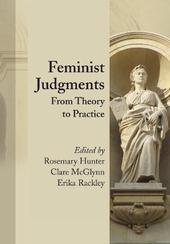
|
Feminist Judgments: From Theory to Practice
Paperback / softback
Main Details
| Title |
Feminist Judgments: From Theory to Practice
|
| Authors and Contributors |
Edited by Professor Rosemary Hunter
|
|
Edited by Clare McGlynn
|
|
Edited by Erika Rackley
|
| Physical Properties |
| Format:Paperback / softback | | Pages:504 | | Dimensions(mm): Height 244,Width 171 |
|
| ISBN/Barcode |
9781849460538
|
| Classifications | Dewey:347.077082 |
|---|
| Audience | | Postgraduate, Research & Scholarly | |
|---|
|
Publishing Details |
| Publisher |
Bloomsbury Publishing PLC
|
| Imprint |
Hart Publishing
|
| Publication Date |
30 September 2010 |
| Publication Country |
United Kingdom
|
Description
While feminist legal scholarship has thrived within universities and in some sectors of legal practice, it has yet to have much impact within the judiciary or on judicial thinking. Thus, while feminist legal scholarship has generated comprehensive critiques of existing legal doctrine, there has been little opportunity to test or apply feminist knowledge in practice, in decisions in individual cases. In this book, a group of feminist legal scholars put theory into practice in judgment form, by writing the 'missing' feminist judgments in key cases. The cases chosen are significant decisions in English law across a broad range of substantive areas. The cases originate from a variety of levels but are primarily opinions of the Court of Appeal or the House of Lords. In some instances they are written in a fictitious appeal, but in others they are written as an additional concurring or dissenting judgment in the original case, providing a powerful illustration of the way in which the case could have been decided differently, even at the time it was heard. Each case is accompanied by a commentary which renders the judgment accessible to a non-specialist audience. The commentary explains the original decision, its background and doctrinal significance, the issues it raises, and how the feminist judgment deals with them differently. The books also includes chapters examining the theoretical and conceptual issues raised by the process and practice of feminist judging, and by the judgments themselves, including the possibility of divergent feminist approaches to legal decision-making. From the foreword by Lady Hale 'Reading this book ought to be a chastening experience for any judge who believes himself or herself to be both true to their judicial oath and a neutral observer of the world... If lawyers and judges like me have so much to learn from reading this book, then surely other, more sceptical, lawyers and judges have even more to learn...other scholars, and not only feminists, must also be fascinated by the window it opens onto the process of judicial reasoning: not the straightforward, predetermined march from A to B of popular belief, but something altogether more complicated and uncertain. And anyone will find it a very good read.'
Author Biography
Rosemary Hunter is a Professor at the University of Kent. Clare McGlynn is a Professor at Durham University. Erika Rackley is a Senior Lecturer in Law at Durham University.
ReviewsWhat's unique about Feminist Judgments is that it does not merely criticise self-proclaimed feminist judges for not being feminist enough. It actually provides the missing judgments that the authors think a feminist judge might have written in more than 20 leading cases from England and Wales. Crucially, the authors have attempted to write rulings based in the law at the times each case was heard. Joshua Rozenberg Law Society Gazette October 28th 2010 Within each of the chapters on the cases themselves, there is a commentary giving basic facts and important information to establish the foundations of the issues and to discuss why the case is significant. The commentary is extremely helpful, as no user is likely to be an expert in all the areas under consideration. Penetrating analysis, with a full, detailed but clear exposition that leaves few stones unturned. Penny Booth Times Higher Education 4 November 2010 To this editor's knowledge, no similar undertaking has been attempted. Even if there were a number of them, they would not likely compare favorably to this adept method of sensibly rewriting judicial history. American Society of International Law Newsletter January 2011
|